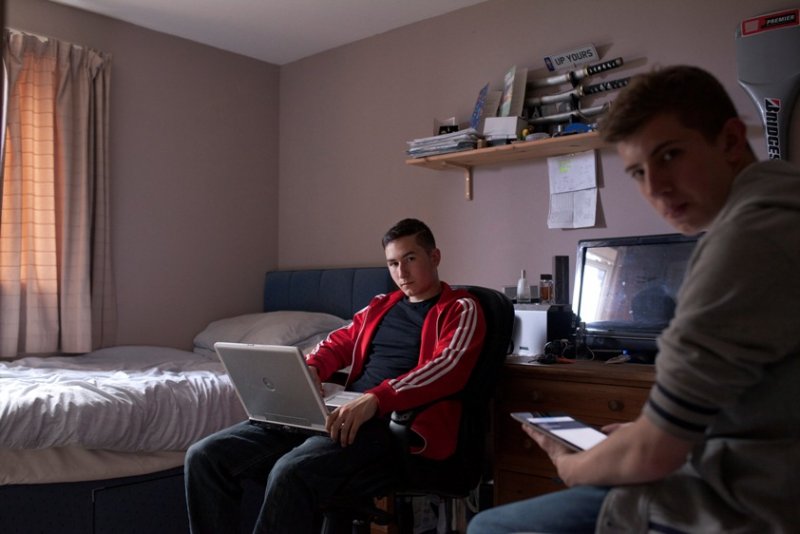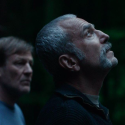While newspapers alternately praise and panic about the glittering world of the Internet, there is a generation of children who have grown up with 24/7 connectivity and a smart phone in their hand.
Public discourse seems to revolve around "grooming" and "privacy", two issues that embody the fears and concerns of adults. What is less discussed is what it really means to always be on, never alone and increasingly bombarded by a world that has something to sell you and appears to know you better than yourself. A world that is so ubiquitous that it is the first and the last thing you see as you wake and go to sleep and, according to the latest estimate, you interact with at least 300 times a day.
For adults there was a "before" the net but at a time of their most rapid development this generation has no other experience and few tools with which to negotiate the overwhelming parade of opportunity and cost that the Internet delivers directly into their hands.
InRealLife attempts to look at this new reality with a cool eye, dividing its 84 minutes between the bedrooms of five disparate teenagers and journeying across the ocean to meet those who both invented and observe the net. In the film’s opening moments, Internet doyenne Sherry Turkle observes that we gave our kids the technology and told them "go use it" before working out whether it is safe – not morally safe, but safe for them to grow up into a world whose heartbeat is commercial.
 Her contribution is bizarrely mirrored by two industry insiders: Louis Von Ahn, the inventor of Capture and Recapture (the brilliant if irritating security code that one types into the "box" to prove you are human) and founder of Wikipedia Jimmy Wales. Ahn knows first-hand the people at the centre and believes in their innate goodness, while Wales observes that if it is in the DNA of Internet companies to sell advertising then however good and well-meaning thee people are, their business model is geared to persuading those with money to spend to click and buy. Neither of them, nor indeed any of the other contributors, suggests that the backdrop of the net is anything but commercial. Dana Boyd, senior researcher for Microsoft, refers to it as "the ugly side of capitalism in which every social action and interaction must be monetised".
Her contribution is bizarrely mirrored by two industry insiders: Louis Von Ahn, the inventor of Capture and Recapture (the brilliant if irritating security code that one types into the "box" to prove you are human) and founder of Wikipedia Jimmy Wales. Ahn knows first-hand the people at the centre and believes in their innate goodness, while Wales observes that if it is in the DNA of Internet companies to sell advertising then however good and well-meaning thee people are, their business model is geared to persuading those with money to spend to click and buy. Neither of them, nor indeed any of the other contributors, suggests that the backdrop of the net is anything but commercial. Dana Boyd, senior researcher for Microsoft, refers to it as "the ugly side of capitalism in which every social action and interaction must be monetised".
Meanwhile back in the UK the teen contributors tell their own stories. Ryan (pictured above left with laptop) sees porn as a tool for learning about sex and talks frankly of the images it creates and its role as a way of pleasuring himself without the "work" of creating intimacy with a real-life girl. Tobin (pictured below right) protests just a bit too much that gaming has nothing to do with his being sent home from Oxford after the first year while admitting that he knows there are other things to do, they just aren’t "easy". Page’s story speaks of the fetishisation of the smartphone as she goes to unimaginable lengths to replace her stolen phone, while the complexity of meeting strangers is touchingly explored by Tom as he goes to meet his online boyfriend for the first time. As you watch the kids speak, you begin to realise that you rarely do hear their voices in the Internet debate, and that they too have caveats and concerns about how it affects their relationships, with each other, and with themselves,
 Contributors as diverse as Joi Ito, director of MIT, and Julian Assange from the Ecuadorean Embassy, plus a worryingly graphic account of the future of teen sexuality from Canadian psychoanalyst Norman Doige and concerns voiced by Maggie Jackson (author of Distracted), are encountered on a journey that follows the fibre optic cables running under the streets of London in sewers all the way to the anonymous palaces of Silicon Valley. The physical presence of the Internet made up of wires and cables, wholly owned by a series of private companies, is a reminder that the nursery language and primary colours of the net obscure big commercial players and high-value stakes.
Contributors as diverse as Joi Ito, director of MIT, and Julian Assange from the Ecuadorean Embassy, plus a worryingly graphic account of the future of teen sexuality from Canadian psychoanalyst Norman Doige and concerns voiced by Maggie Jackson (author of Distracted), are encountered on a journey that follows the fibre optic cables running under the streets of London in sewers all the way to the anonymous palaces of Silicon Valley. The physical presence of the Internet made up of wires and cables, wholly owned by a series of private companies, is a reminder that the nursery language and primary colours of the net obscure big commercial players and high-value stakes.
The Internet is now too big and too ubiquitous for anyone to see into all its crevices but InRealLife opens a discussion of a different hue to the moral panic of papers and politicians as it suggests we look again at what the true price of the "open free" net really is.
A small group of players addicted to windfall profits have created a world in which our kids are merely pawns in the game of the bottom line. They are adapting to this new world, along with their expectations of friendship, their cognition and their sexuality. As it builds to a worrying conclusion InRealLife asks, “ If we have outsourced our children to the net?”
- InRealLife opens in cinemas on 20 September with a nationwide screening and live satellite Q&A with Jon Snow, Beeban Kidron and special guests at 1pm on Sunday 22 September. See website for more details and participating cinemas.
Overleaf: watch the trailer for InRealLife















Add comment